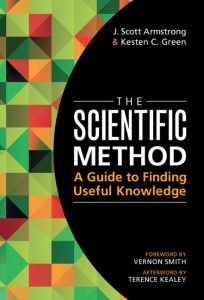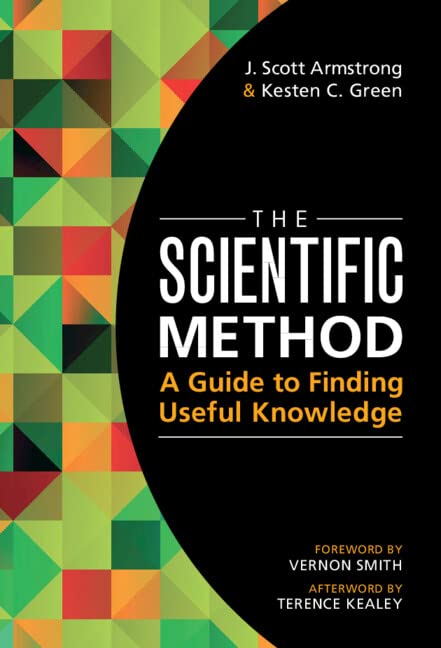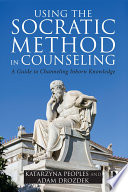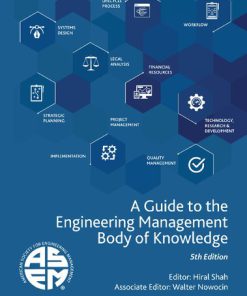The Scientific Method A Guide to Finding Useful Knowledge 1st Edition by J Scott 9781009090513 1009090518
$50.00 Original price was: $50.00.$25.00Current price is: $25.00.
The Scientific Method A Guide to Finding Useful Knowledge 1st Edition J. Scott Armstrong – Ebook Instant Download/Delivery ISBN(s): 9781009090513, 1009090518

Product details:
- ISBN 10:1009090518
- ISBN 13:9781009090513
- Author: J Scott
The Scientific Method
A Guide to Finding Useful Knowledge
Table contents:
Tables
Checklists
Foreword: by Vernon L. Smith
Study Important Problems: by Vernon L. Smith
Build on Prior Knowledge: by Vernon L. Smith
Use Objective Designs: by Vernon L. Smith
Provide Full Disclosure: by Vernon L. Smith
Use Valid and Reliable Data: by Vernon L. Smith
Use Valid Simple Methods: by Vernon L. Smith
Objective Designs: Testing Multiple Hypotheses: by Vernon L. Smith
Draw Logical Conclusions: by Vernon L. Smith
Acknowledgments
Who is this book for?
Authors’ Oath for The Scientific Method
1 Introduction
1.1 Plan of This Book
1.2 Scientific Method versus Scientist Opinion
1.3 Objective of the Scientific Method
1.4 Objectives of Scientific Practice Subverting Science
1.5 Operational Guidelines for Scientific Practice
1.5.1 Previous Attempts at Guidelines for Science
1.5.2 Guidelines Necessary, but Not Sufficient
1.5.3 Mandated Checklists Necessary
2 Defining the Scientific Method
2.1 An Aspirational Definition
2.2 Criteria for Complying with the Scientific Method
2.2.1 Study Important Problems
2.2.2 Build on Prior Knowledge
2.2.3 Provide Full Disclosure
2.2.4 Use Objective Designs
2.2.5 Use Valid and Reliable Data
2.2.6 Use Valid Simple Methods
2.2.7 Use Experimental Evidence
2.2.8 Draw Logical Conclusions
3 Checklist for the Scientific Method
3.1 Development of the Compliance With Science Checklist
3.2 Using the Checklist: For What, How, and by Whom
3.3 Not All Checklists Are Useful
3.4 Ensuring That Checklists Are Used
4 Assessing the Quality of Scientific Practice
4.1 How We Reviewed Evidence on Research Practice
4.2 Do Journal Papers Help Readers to Make Better Decisions?
4.3 More Replications of Important Papers Needed
4.4 Are Papers in Scientific Journals Replicable?
4.4.1 Replications Can Reverse Influential Prior Findings
4.4.2 Criteria for a Successful Replication
4.4.3 Conditions Favoring Successful Replications
4.4.4 Failures of Disclosure Undermine Replication
4.5 How Much of a Concern Is Cheating?
4.6 How Efficient Is Research?
5 Scientific Practice: Problem of Advocacy
5.1 Unnaturalness of Objectivity
5.2 Confirmation Bias
5.3 How Advocacy Is Practiced
5.3.1 Showing Only Evidence Favoring Hypothesis
5.3.2 Ignoring Cumulative Scientific Knowledge
5.3.3 Avoiding Specifying Conditions That Admit Rejection
5.3.4 Avoiding Tests of ex ante Predictive Validity
5.3.5 Ignoring Important Causal Variables
5.3.6 Failing to Use Experimental Evidence
5.3.7 Using Machine Learning Methods
5.3.8 Using Faulty Logic
5.3.9 Using ad hominem and Authority Arguments
5.4 Prevalence and Acceptance of Advocacy
5.4.1 Extent to which Psychology Papers Are Scientific
5.4.2 Advocacy vs Objectivity among Psychology Papers
6 Scientific Practice: Problem of Journal Reviews
6.1 Failure to Find Errors
6.2 Advocacy by Reviewers and Editors
6.3 Unreliable Reviews
6.4 Failure to Improve Papers
6.5 Fooled by Fraudulent Reviews and Bafflegab
6.6 Distracted by Statistical Significance Tests
6.7 Blind to Importance of Authors’ Previous Contributions
6.8 Long Delays in Publication
7 Scientific Practice: Problem of Government Involvement
7.1 Being Useful
7.2 Funding
7.2.1 Government Funding since WWII
7.2.2 Government Funding and Advocacy
7.2.3 Government Funding of Groups of Scientists
7.3 Regulation
7.3.1 Consent Forms
7.3.2 Institutional Review Boards and Ethics Committees
7.3.3 No Evidence of Benefit from Regulation of Science
7.3.4 Speech Restriction and Self-Censorship
8 What It Takes To Be A Good Scientist
8.1 General Mental Ability
8.2 Family Propensity
8.3 Early Desire to Do Scientific Research
8.4 Personality
8.5 Motivated by Intrinsic Rewards
8.6 Self-Control
8.7 Skepticism
8.8 Your Decision
8.9 Navigating a Doctoral Program
8.10 Acting as a Scientist in all Relevant Roles
9 How Scientists Can Discover Useful Knowledge
9.1 Identifying Important Problems
9.1.1 Work Independently
9.1.2 Problem-Storm Using Brainwriting
9.1.3 Develop Solutions Alone, Ignoring Current Solutions at First
9.1.4 Get Close to the Problem to Learn About Current Solutions
9.1.5 Seek Help from Others
9.1.6 Build on Potential Solutions While Avoiding Evaluation
9.2 Selecting a Problem
9.2.1 Choose a Problem for Which Findings Are Likely to Provide Benefits without Duress or Deceit
9.2.2 Be Skeptical about Findings, Theories, Policies, Methods, and Data When Lacking Experimental E
9.2.3 Consider Conducting Replications and Extensions of Papers That Address Important Problems
9.2.4 Ensure That You Can Address the Problem Impartially
9.2.5 If You Need Funding, Ensure That You Will Nevertheless Have Control Over Your Study
9.3 Designing a Study
9.3.1 Summarize Existing Scientific Knowledge about the Problem
9.3.2 Develop Multiple Reasonable Hypotheses With Specified Conditions Prior to Any Analysis
9.3.3 Design a Study That Minimizes the Risk of Harm to Subjects
9.3.4 Pretest Experiments
9.3.5 Warn Subjects That They Might Find the Task Unpleasant
9.3.6 Consider Role-Playing as an Alternative to Experimentation
9.3.7 Design Experiments That Estimate the Effect of Directions and Sizes So as to Identify the Best
9.4 Collecting Data
9.4.1 Obtain All Valid Data
9.4.2 Ensure That the Data Are Reliable
9.5 Analyzing Data
9.5.1 Use Models That Incorporate Cumulative Knowledge
9.5.2 Use Simple Methods
9.5.3 Use Multiple Validated Methods
9.5.4 Draw Conclusions Only on Practical Importance of Effects
10 How Scientists Can Disseminate Useful Findings
10.1 Writing a Scientific Paper
10.1.1 What to Include in a Scientific Paper
10.1.1.1 Explanation of Findings, and Why They Are Credible and Useful
10.1.1.2 Descriptions of Prior Hypotheses and any Changes
10.1.1.3 Descriptions of Data and Methods Allowing Assessments of Validity, and Replication
10.1.1.4 Verified Citations of Scientific Papers with Substantive Findings Relevant to the Evidence
10.1.1.5 List of Those Who Provided Author-Solicited Peer Review
10.1.1.6 List of Funders Who Expect to be Acknowledged
10.1.1.7 An Oath on Responsibility and Disclosure
10.1.2 Avoid Distractions When Writing
10.2 Disseminating Findings
10.2.1 Publishing
10.2.1.1 Provide Thorough Responses to Journal Reviewers
10.2.1.2 If Useful Scientific Findings Are Rejected, Appeal to the Editor
10.2.1.3 Publish in PLoS ONE or Similar if You Meet Their Criteria
10.2.1.4 Publish a Working Paper on ResearchGate or Similar
10.2.1.5 Publish Research Findings in a Book
10.2.1.6 Directly Inform Those Who Can Use Your Findings
10.2.1.7 Cooperate with Those Who Want to Replicate Your Study
10.2.1.8 Publish Corrections for Any Mistakes Found After Publication
10.2.2 Preparing a Talk and Giving a Presentation
11 How Stakeholders Can Help Science
11.1 Universities
11.1.1 Hiring Scientists
11.1.1.1 Evidence of Prior Useful Research
11.1.1.2 Contracts with Scientists
11.1.2 Freedom to Think and Speak
11.1.3 Diversity of Ideas
11.1.4 Foster Creativity
11.1.5 Require Researchers to Report Useful Findings
11.1.6 Disseminate Useful Knowledge
11.1.7 Employ an Ombudsman
11.2 Scientific Journals
11.2.1 Invite Papers with Useful Scientific Findings
11.2.2 Require Structured Abstracts
11.2.3 Require Disclosure, Justified Citations, Readability
11.2.4 Require an Oath that Standards Were Upheld
11.2.5 Use Benford’s Law to Identify Data Fabrication
11.2.6 Insist on Cost-Benefit Implications of Effect Size Estimates
11.2.7 Invite Papers from Leading Scientists
11.2.8 Use Reviews to Improve, Not Reject, Papers
11.2.9 Use the Compliance With Science Checklist to Structure Reviews
11.2.10 Use Operational Criteria to Select Objective Research Papers
11.2.11 Create a Compliant with Science Papers Section
11.2.12 Publish Summaries of Useful Scientific Findings
11.2.13 Continue Publishing Other Material of Interest to Scientists
11.3 Governments, Regulators, and Courts
11.4 Media and Interested Groups and Individuals
12 Rescuing Science from Advocacy
12.1 From Where Should Funding Come?
12.2 Advocacy
12.3 Bureaucracy and Irrelevant Incentives
12.4 How Stakeholders Can Contribute
12.4.1 Scientists
12.4.2 Universities
12.4.3 Media
12.4.4 Courts of Law
12.4.5 Separating Science from the State
Afterword
References
Index
People also search:
the scientific method a guide to finding
the scientific method a guide to finding useful knowledge pdf
what are the 4 steps to the scientific method
what is the scientific method step by step
what are the four steps to the scientific method
You may also like…
Mathematics - Computational Mathematics
Introduction to the Finite Element Method 4E 4th Edition J. N. Reddy
Psychology - Psychotherapy
Education Studies & Teaching
Scientific Knowledge As A Culture The Pleasure Of Understanding 1st Edition Igal Galili
Psychology - Psychotherapy
Engineering - Engineering - General & Miscellaneous
A Guide to the Engineering Management Body of Knowledge, 5th Edition Hiral Shah
Reference - Writing
A Pocket Guide to Scientific Writing in Aquaculture Research 1st Edition Yossa
Computers - Networking
Children's Books - Science Fiction & Fantasy
The Serpent s Fury Royal Guide to Monster Slaying 3 1st Edition Kelley Armstrong Armstrong Kelley
Uncategorized












